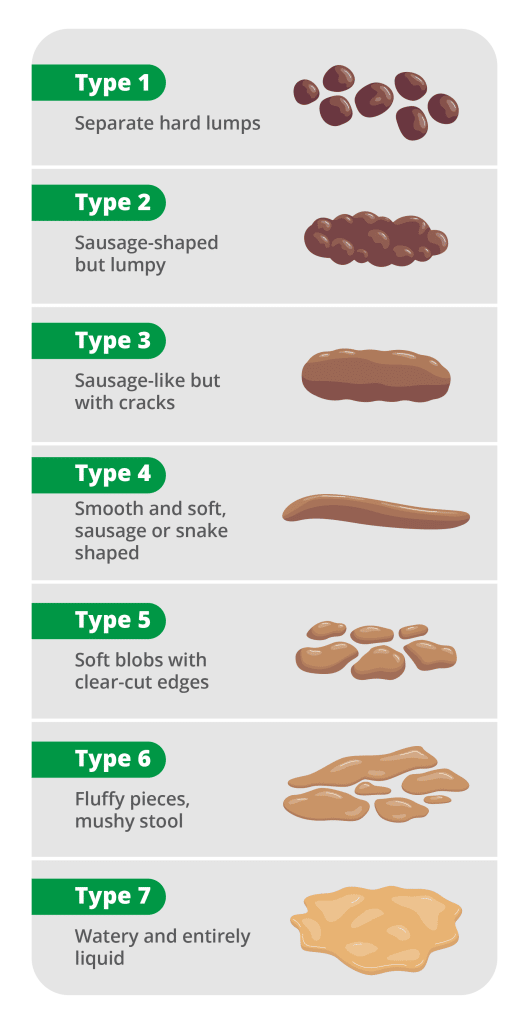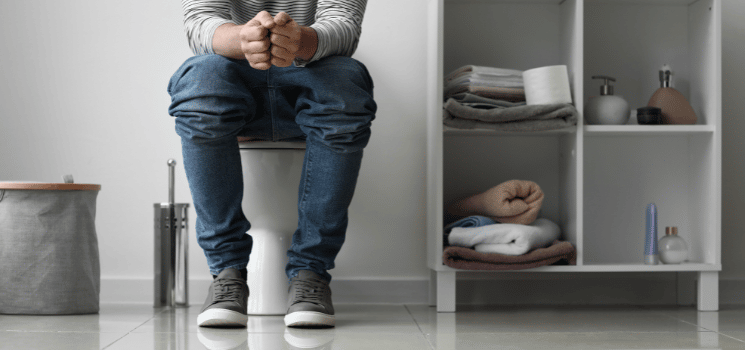Pooping (passing motion/faeces/stool) is a critical part of our body’s digestive process which involves the discharge of undigested food, waste (including toxins), and other substances from the intestines.
While the state of your poop is an indication of what you have eaten, it can also uncover the state of your health or any underlying health conditions.
Read on to find out what you can learn from your poop and what you should look out for.
What should my poop look like (as a healthy person)?
While healthy poop might vary among different individuals there are a few standard attributes such as colour, size, smell, consistency and how long it takes for it to pass, that can indicate the current state of your health.
Colour
The colour of faeces is influenced by bile salts contained in bile (yellowish-green fluid), which are secreted from the gallbladder to help digest fats in our food.
As bile pigments travel through your gastrointestinal tract, enzymes chemically alter their colour from green to brown.
Green poop: While brown is considered the healthy colour in stools, it can sometimes appear green if food travels through the intestines too quickly. When this happens, insufficient time was given for the enzymes to break down the bile salts. A common cause for green poop is the consumption of certain foods such as dark coloured vegetables.
White/ clay coloured poop: This usually is a result of the bile salts not being able to get into the faeces. Some common causes include cancers (e.g. bile duct cancer, pancreas cancer and liver cancer), stones in the bile duct (e.g. from the gallbladder may also cause white poop). Large amounts of certain bismuth subsalicylate in medication (e.g. pepto bismol) may also cause this.
Black poop: Black and dark coloured stool can be a common side-effect of taking iron supplements or medication. People who love black liquorice candy and blueberries may also have black stool. With that being said, a more worrying cause of black stool is bleeding in the upper gastrointestinal tract (e.g. stomach, small intestines) which could be a symptom of cancer or a ulcer.
Red poop: While this can be caused by diets that include red Vietnamese fruits or beetroot, presence of blood can be the worrying cause of red stool. Inflammation of the small or large intestines, haemorrhoids, colon cancer, large colon polyps and diverticular disease (small sacs in the colon walls) may cause the blood in the stool.
Orange poop: This is mainly from dietary intake of orange coloured food such as carrots, pumpkins or winter squash.
Yellow, greasy, foul-smelling poop: Such stools may be hard to flush away or float on the toilet water. This could be a sign of pancreas diseases (eg autoimmune pancreatitis) and other malabsorption diseases (coeliac disease).
Shape, size and consistency
It can be helpful to notice the size, shape and consistency in our poop as they can have medical implications on our health. These characteristics in poop have been well studied in a universally used criteria or classification called the Bristol Stool Chart below.

Stool shape and consistency mainly depend on hydration and our diet.
Typically, most of us would have encountered all these stool types (Type 1-7) at some point of time in our lives. However, most of the time, we will pass only one type of stool. The most common and healthy stools are type 3 – 5.
Type 1 – 2 suggest hard textured stools. These stools may be hard to pass and may even cause a tear in the lining of the intestines when straining too hard. If you encounter type 1 – 2 stools, you should increase your intake of fibre and drink more water.
Types 6 & 7 type stools which are characterised by loose consistency may warrant investigation (e.g. stool analysis, colonoscopy) if persistent.
Quantity and frequency
How much and how frequently you poop should be proportionate to your appetite and the amount of food you consume. For example, consuming 500g of food daily but only having a bowel movement once every 3 days for 100g of stool could indicate a build-up of stool in the intestines. While a normal bowel movement frequency ranges anywhere from one to three times a day, infrequent bowel movement, also known as constipation, can lead other symptoms caused by the fermentation of stool in the colon over time.
When should I be worried?
Here are some red flags and symptoms you should look out for that might require further investigation or immediate attention if they don’t go away.
Change in pooping habit
A sudden and noticeable change in your bowel habits (e.g. pooping more or less frequently) could be a symptom of certain health conditions. Reach out to a doctor for further investigation if change in bowel habits persist for more than 2 months.
Change in stool consistency
Diarrhoea, when your poop becomes watery and loose in consistency (Bristol stool chart types 6/7), may be an indication of viral infection, food poisoning or other chronic conditions (e.g. inflammatory bowel disease or Crohn’s disease, ulcerative colitis, bile salt malabsorption). Seek medical attention immediately if your diarrhoea persists for more than 3 days.
Urgency to poop
Typically, we should be able to hold our need to poop for 5 to 10 minutes. Severe urgency to rush to the toilet to empty your bowels cold be an indication of diseases such as inflammatory bowel disease, and diarrhoea predominant irritable bowel syndrome (IBS-D) which require further investigation.
Unable to empty bowels despite pooping
Tenesmus is the constant feeling of needing to pass motion even after you have already done so in the toilet. You should see a doctor if you have been experiencing tenesmus for several weeks.
Blood in the poop
Black or red coloured poop or presence of blood should be investigated immediately. While dark coloured stools point to bleeding in the upper GI tract (e.g. esophagus, stomach), bright red blood on the toilet paper or in the toilet bowl points to bleeding from the lower GI (e.g. colon or rectum) which could be an indication of various diseases such as cancer in the left colon, inflammation of the intestines, haemorrhoids, and anal fissure.
Getting up to poop in the middle of the night
Most of us should experience uninterrupted sleep through the night, or at least during the first few hours of falling asleep. However, waking up once or multiple times in the middle of the night to poop could affect your quality of life and be an indication of serious health conditions.
The following article was written by Senior Consultant, Gastroenterology & Hepatology (Liver),
Dr Christopher Kong San Choon. Book an appointment with Dr Kong if you are experiencing any worrying symptoms in your bowel movement.






